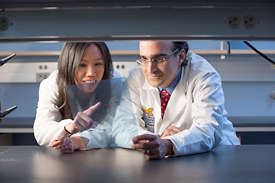Benefit upgrades and new monthly orientation sessions for postdoctoral research fellows are boosting their training environment to help the University of Michigan maintain its reputation as an exceptional research university.
The most significant change is that postdocs now are eligible for up to six weeks per year of paid extended leave, once they have been employed for at least six months. Revised language in the Standard Practice Guide clarifies the holidays, season days, and the number of vacation and sick days available to research fellows.

Emilyn Alejandro, research fellow in internal medicine in the Medical School, works with Associate Professor Dr. Ernesto Bernal-Mizrachi. Photo by Austin Thomason, Michigan Photography.
“On a personal level, this policy could have not arrived at a better time for me,” says Emilyn Alejandro, research fellow in internal medicine, in the Medical School. She and her husband are expecting a child. “I am elated that the University of Michigan is implementing this new policy, which will have an important and positive impact to all post-doctoral trainees. Longer family leave means that more children will have a better chance of getting a good start in life.”
The changes were directed by Janet Weiss, dean of the Rackham Graduate School and vice provost for research, and Peter Hitchcock, associate dean for academic programs and initiatives at Rackham. “The university wants to be sure that we are providing an outstanding training environment for postdocs. We want our benefits and policies to support both work and family, and we want to be competitive with peer institutions to attract talented researchers to Michigan,” Weiss says.
The changes affect nearly 1,400 postdoctoral research fellows. “These early-career scientists and scholars undertake much of the day-to-day research activities on our campus, and our faculty rely on the energy and creativity of postdocs to propel research programs and advance the boundaries of research and scholarship,” Hitchcock says. He adds that the accomplishments of postdoctoral fellows allow faculty to successfully compete for external funding and to maintain U-M’s research reputation.
Joshua Scheys, postdoctoral fellow in the Brehm Center for Diabetes Research and co-chair of the University of Michigan Postdoctoral Association, says the group fully supports the new policy and applauds efforts “to ensure that postdoctoral fellows are treated on par with faculty and staff at the university.”
Prior to the extended leave policy, postdoctoral fellows were eligible for three weeks of sick leave per year. This period covered all contingencies, including serious illness or childbirth. Many postdocs, particularly those having children, often were forced to take unpaid leave. “This was a potential hardship for postdocs and inconsistent with the university’s goal that family-friendly policies be available to all members of the university community,” Hitchcock says.
The extended leave policy covers instances when postdocs are unable to work due to serious illness, serious injury or childbirth. Those who are eligible under the Family and Medical Leave Act of 1993 will continue to be eligible for up to 12 weeks of unpaid leave. The procedures are detailed in SPG section 201.19, updated in late August.
The resources and innovations are among topics covered at the monthly orientation sessions for new research fellows, jointly offered by the Medical School Office of Postdoctoral Studies and the Rackham Graduate School. New postdoc orientations are at 1:30 p.m. on the first Wednesday each month in the Rackham Building lower level Common Room. Attendance is recommended to postdocs who joined the university in the prior month, but any postdoc is welcome.
Also in the past year, new school-specific dispute resolution policies and procedures have been implemented. “This was undertaken to provide a consistent approach in how a school, college or unit might handle a dispute and to bring transparency to the dispute resolution process,” Hitchcock says.
Details about benefits, dispute resolution assistance and other resources are available at the Academic Human Resources website: hr.umich.edu/acadhr. For more information on the orientation, or other initiatives for research fellows, contact Pat McCune, 647-4559 or phmccune@umich.edu.

